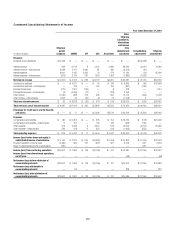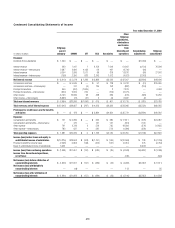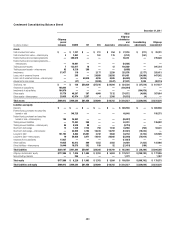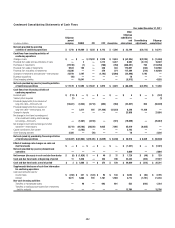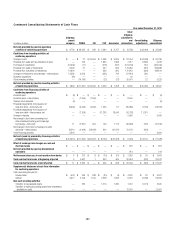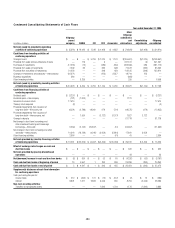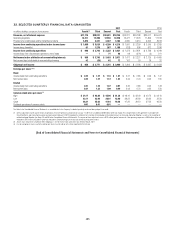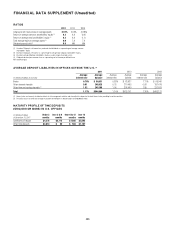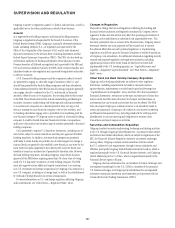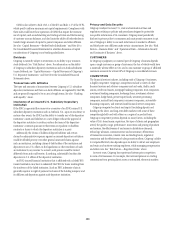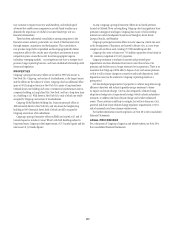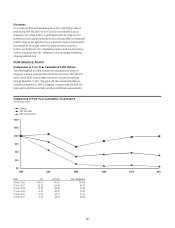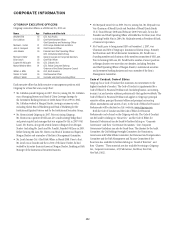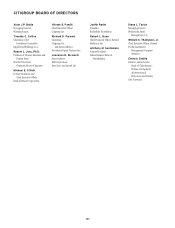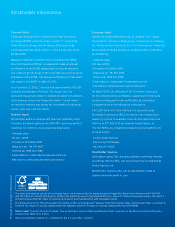Citibank 2011 Annual Report Download - page 309
Download and view the complete annual report
Please find page 309 of the 2011 Citibank annual report below. You can navigate through the pages in the report by either clicking on the pages listed below, or by using the keyword search tool below to find specific information within the annual report.287
SUPERVISION AND REGULATION
Citigroup is subject to regulation under U.S. federal and state laws, as well as
applicable laws in the other jurisdictions in which it does business.
General
As a registered bank holding company and financial holding company,
Citigroup is regulated and supervised by the Board of Governors of the
Federal Reserve System (FRB). Citigroup’s nationally chartered subsidiary
banks, including Citibank, N.A., are regulated and supervised by the
Office of the Comptroller of the Currency (OCC) and its state-chartered
depository institution by the relevant State’s banking department and the
Federal Deposit Insurance Corporation (FDIC). The FDIC also has back-up
enforcement authority for banking subsidiaries whose deposits it insures.
Overseas branches of Citibank are regulated and supervised by the FRB and
OCC and overseas subsidiary banks by the FRB. Such overseas branches and
subsidiary banks are also regulated and supervised by regulatory authorities
in the host countries.
A U.S. financial holding company and the companies under its control
are permitted to engage in a broader range of activities in the U.S. and
abroad than permitted for bank holding companies and their subsidiaries.
Unless otherwise limited by the FRB, financial holding companies generally
can engage, directly or indirectly in the U.S. and abroad, in financial
activities, either de novo or by acquisition, by providing after-the-fact notice
to the FRB. These financial activities include underwriting and dealing in
securities, insurance underwriting and brokerage and making investments
in non-financial companies for a limited period of time, as long as Citi
does not manage the non-financial company’s day-to-day activities, and
its banking subsidiaries engage only in permitted cross-marketing with the
non-financial company. If Citigroup ceases to qualify as a financial holding
company, it could be barred from new financial activities or acquisitions,
and have to discontinue the broader range of activities permitted to financial
holding companies.
Citi is permitted to acquire U.S. depository institutions, including out-of-
state banks, subject to certain restrictions and the prior approval of federal
banking regulators. In addition, intrastate bank mergers are permitted
and banks in states that do not prohibit out-of-state mergers may merge. A
national bank can generally also establish a new branch in any state (to the
same extent as banks organized in the subject state) and state banks may
establish a branch in another state if permitted by the other state. However,
all bank holding companies, including Citigroup, must obtain the prior
approval of the FRB before acquiring more than 5% of any class of voting
stock of a U.S. depository institution or bank holding company. The FRB
must also approve certain additional capital contributions to an existing
non-U.S. investment and certain acquisitions by Citigroup of an interest in a
non-U.S. company, including in a foreign bank, as well as the establishment
by Citibank of foreign branches in certain circumstances.
For more information on U.S. and foreign regulation affecting Citigroup
and its subsidiaries, see “Risk Factors—Regulatory Risks” above.
Changes in Regulation
Proposals to change the laws and regulations affecting the banking and
financial services industries are frequently introduced in Congress, before
regulatory bodies and abroad that may affect the operating environment of
Citigroup and its subsidiaries in substantial and unpredictable ways. This
has been particularly true as a result of the financial crisis. Citigroup cannot
determine whether any such proposals will be enacted and, if enacted,
the ultimate effect that any such potential legislation or implementing
regulations would have upon the financial condition or results of operations
of Citigroup or its subsidiaries. For additional information regarding recently
enacted and proposed legislative and regulatory initiatives, including
significant provisions of the Dodd-Frank Act that have not been fully
implemented by the U.S. banking agencies, see “Capital Resources and
Liquidity—Regulatory Capital Standards” and “Risk Factors—Regulatory
Risks” above.
Other Bank and Bank Holding Company Regulation
Citigroup and its banking subsidiaries are subject to other regulatory
limitations, including requirements for banks to maintain reserves
against deposits, requirements as to risk-based capital and leverage (see
“Capital Resources and Liquidity” above and Note 20 to the Consolidated
Financial Statements), restrictions on the types and amounts of loans that
may be made and the interest that may be charged, and limitations on
investments that can be made and services that can be offered. The FRB
may also expect Citigroup to commit resources to its subsidiary banks in
certain circumstances. Citigroup is also subject to anti-money laundering
and financial transparency laws, including standards for verifying client
identification at account opening and obligations to monitor client
transactions and report suspicious activities.
Securities and Commodities Regulation
Citigroup conducts securities underwriting, brokerage and dealing activities
in the U.S. through Citigroup Global Markets Inc., its primary broker-dealer,
and other broker-dealer subsidiaries, which are subject to regulations of the
SEC, the Financial Industry Regulatory Authority and certain exchanges,
among others. Citigroup conducts similar securities activities outside
the U.S., subject to local requirements, through various subsidiaries and
affiliates, principally Citigroup Global Markets Limited in London, which is
regulated principally by the U.K. Financial Services Authority, and Citigroup
Global Markets Japan Inc. in Tokyo, which is regulated principally by the
Financial Services Agency of Japan.
Citigroup also has subsidiaries that are members of futures exchanges and
are registered accordingly. In the U.S., CGMI is a member of the principal
U.S. futures exchanges, and Citigroup has subsidiaries that are registered
as futures commission merchants and commodity pool operators with the
Commodity Futures Trading Commission (CTFC).



